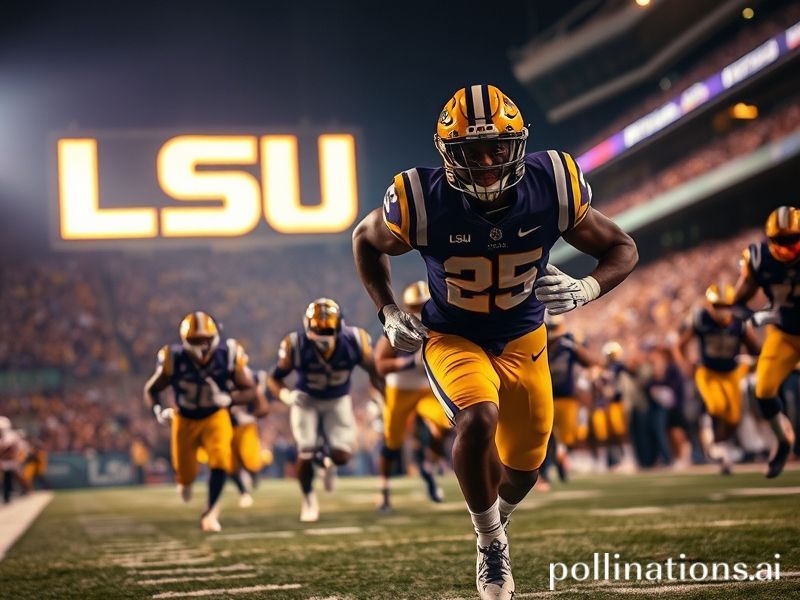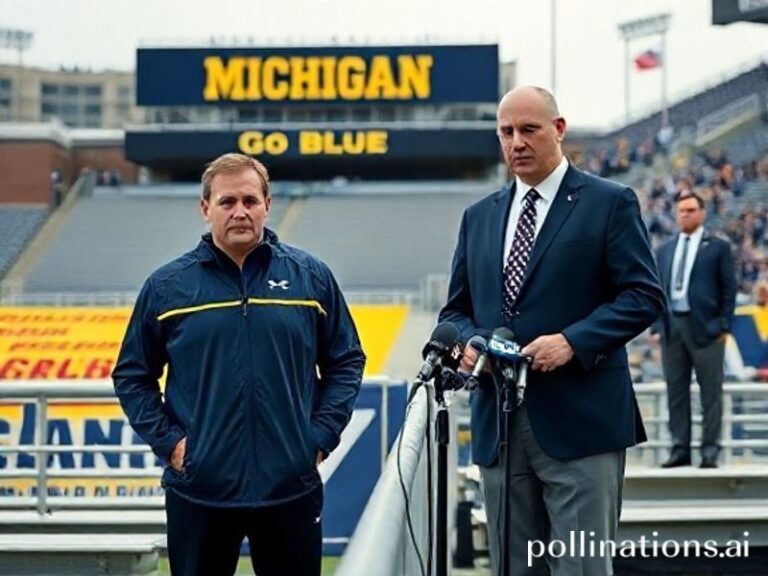Zachariah Branch: How One American Teen Outran the World’s Attention Span
Zachariah Branch, a 19-year-old wide receiver from Las Vegas, has spent the last year sprinting across American football fields so quickly that satellites briefly lose him. To most of the planet—where “first down” is still mistaken for a military order—the name registers about as strongly as a local bus timetable in Ulan Bator. Yet the Branch phenomenon is quietly teaching the world a lesson it never asked for: when the United States sneezes into its own navel, the rest of us still catch the flu of overexposure.
Start with the basics. Branch is not yet old enough to rent a car in most jurisdictions, but he is already worth an estimated seven figures in Name-Image-Likeness deals. That figure, for context, exceeds the annual health-care budget of several Pacific island nations whose citizens will nonetheless watch his highlights on phones charged by diesel generators. The kid runs a 4.2-second 40-yard dash; the planet, meanwhile, is running a four-decade marathon toward climate catastrophe at roughly the same speed Congress updates its filing system. One of these races gets wall-to-wall coverage on ESPN, the other gets a melancholic sidebar in the climate section. Guess which pays better.
Zoom out geographically and the absurdities multiply. In Senegal, aspiring sprinters train on beaches at dawn because synthetic tracks are as rare as honest campaign finance reports. In Ukraine, gridiron football exists mainly as a scrappy weekend hobby played on converted Soviet parade grounds. Yet algorithms in Silicon Valley—where “disruption” is the polite term for monetizing someone else’s childhood—have already decided that Zachariah Branch’s one-handed snag against Arizona State is more relevant to a teenager in Dakar than the price of millet. The internet, that great equalizer, equalizes mainly by flattening everything into the same sponsored content smoothie.
Europe, ever the bemused older cousin at the American cookout, reacts with its customary cocktail of envy and superiority. French sports dailies run explainers headlined “Le Football Américain, C’est Quoi?” next to 3,000-word laments about the moral decline of Ligue 1 finances. German data scientists produce elegant charts proving that Branch’s top speed would place him behind only one regional ICE train between Frankfurt and Cologne, a fact satisfying to exactly nobody outside the Bundesverkehrsministerium. Meanwhile, British tabloids attempt to claim him via a great-grandmother who once drank a Coca-Cola in Swindon, because nothing says “global Britain” like colonial genealogy cosplay.
The Chinese sports market—population 1.4 billion, appetite for American spectacle voracious—has already translated Branch’s highlight reels into Mandarin with breathless captions like “闪电小子” (“Lightning Kid”). Viewed through the lens of the Middle Kingdom’s own sports-industrial complex, where table-tennis prodigies are forged in state boarding schools, Branch represents both validation of the American dream and proof that free-market chaos occasionally drops a gold nugget into the sluice box. Alibaba’s streaming arm is rumored to be preparing a documentary titled “From Vegas to Valhalla,” which will presumably ignore the inconvenient detail that Vegas itself is projected to run out of water long before Branch qualifies for an NFL pension.
And then there’s the money—sweet, carbon-intensive, geopolitically destabilizing money. The same weekend Branch torched Colorado for 222 all-purpose yards, global remittances to sub-Saharan Africa hit a record $54 billion. The juxtaposition isn’t causal, of course; it’s merely grotesque. One kid’s autograph now trades for the yearly salary of a Nairobi ICU nurse, while cryptocurrency bros in Dubai bet on his future draft position like it’s a derivative indexed to human hope. If you listen closely, you can hear Thomas Piketty quietly sobbing into his regression models.
So what, if anything, does Zachariah Branch mean to a planet that never asked for another American idol? Perhaps only this: we have built a world where a teenager’s ability to juke past linebackers reverberates louder than glaciers calving into the sea. It’s not Branch’s fault; he’s just the latest high-resolution symptom of a low-resolution age. The rest of us will continue refreshing our feeds, half-awed, half-ashamed, waiting for the next kid to outrun our collective attention span before the signal cuts to an ad for sports betting. In the meantime, the clock on climate change ticks slower than a replay review, but unlike the NFL, this particular game has no commercial breaks—only overtime, sudden death, and no lucrative broadcast rights to sell after the final whistle.







